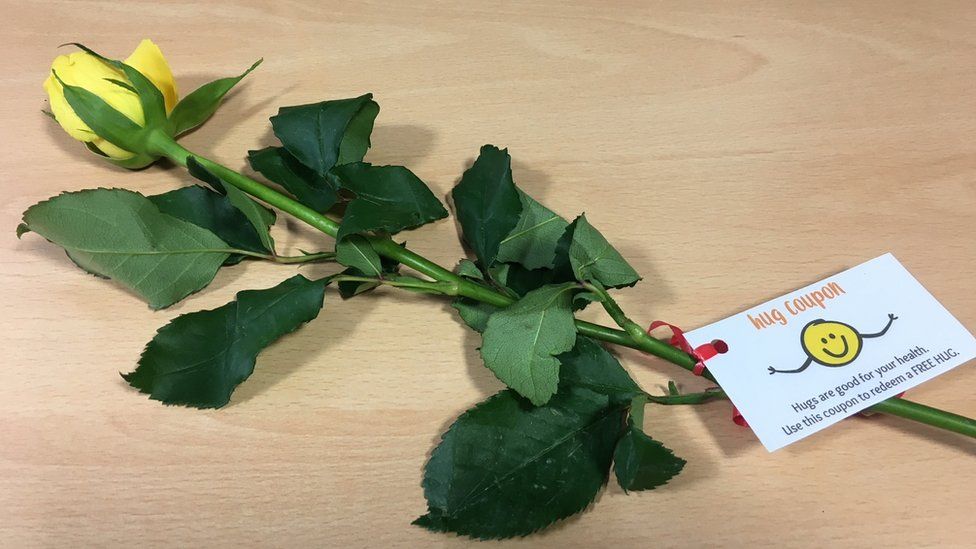Happy Cafe serves up cup of wellbeing for students
- Published

"Hug coupon. Hugs are good for your health. Use this coupon to redeem a FREE HUG."
I've never been greeted with a rose at the start of an interview, let alone one bearing the above message.
But users of Wales' first Happy Cafe are old hands at giving - and receiving - such gifts. The monthly drop in sessions at the cafe, on Coleg Gwent's Crosskeys campus in Caerphilly county, aim to do just what the name suggests: make people happier, help them relax and recharge, and boost wellbeing, all over a cup of tea.
The Happy Cafe concept is a global phenomenon, an offshoot of the Action for Happiness movement founded in the UK but active in more than 170 countries, which aims, simply, to bring more happiness into people's lives.
This is something which the college's school of care lecturer Victoria English has made her mission. After suffering from anxiety in her own life, she discovered mindfulness, and resolved to make it a core part of her independent living skills' students college experience.
The students, who have additional learning needs and range in age from 16 to 25, have incorporated mindfulness into their classroom time, taking quiet time out with closed eyes and breathing exercises to improve their mood.
Head of school of care, Debbie Field, facilitated Ms English's mindfulness training for the students because she saw the importance of it for them.
"It underpins the curriculum. It's all focused on how we can do better for the learners; how they can gain the most from their experience of college. If they are mindful and ready to learn, they do well," she said.
Taylor, from one of Ms English's classes, said of the practice: "It can really help keep me calm and sort out my emotions", while others gave similar positive feedback on the practice.
Action for Happiness lists 10 "keys" remembered through the phrase Great Dream - giving, relating, exercising, awareness, trying out, direction, resilience, emotions, acceptance, meaning.
The students live some of these keys through activities incorporated into their curriculum, including a day of "random acts of kindness".
They have been making "awesome" jars, where students are encouraged to write something they like about a person, which goes into an individual's jar.
They can pick out one of the messages at a later stage, which as one said, "makes me see that I am liked".
All this has fed into the idea of the Happy Cafe, which exist in countries stretching from the USA across Europe and Asia to Australia, and has been running at the college for a year.
For the May cafe, they made glitter jars, which Ms English said resembled the mind, in particular the amygdala, the centre for emotions and behaviour.
When the jars are swirled, the glitter symbolises thoughts and information swirling around which prevent people from thinking and acting clearly. By watching the glitter settle, it is supposed to help calm an anxious or stressed person, and mimic the process in the brain of clearing the head.
The students' actions are not all self-centred. An important part of the 10 steps is giving and relating. They have raised money for charity, most recently £400 for the homeless charity Llamau.
Ms English said: "We got lots of clothes for the homeless and Salvation Army. We've done things for Guide Dogs for the Blind and Latch [cancer charity]. We've raised over £2,000 for different causes.
"There's no barrier to what they can do. They set the example to the mainstream students."
The Happy Cafe message has spread out to other staff and students beyond the school of care.
It also works to bring down barriers between staff and students.
Ms Field said one of the things that impressed her the most was the volume of noise from the chatting, despite the fact students were mingling with teachers and support staff.
Ms English has long had an interest in "positive psychology" and is determined to see that message spread.
"I have noticed children are suffering more with mental health problems," she said.
"I have used mindfulness as I suffered with anxiety myself and I wanted to spread the word to give them a tool kit to help them to cope with stresses of day-to-day living.
"I have been really surprised at how openly they have embraced it. In fact, they are coming back to ask for more."
She is now approaching local schools as well as community groups with the hope they will get involved.
"I think that our education system should invest in the mental health and wellbeing of our young people. It shouldn't just be at crisis times."
- Published15 March 2018
- Published13 January 2018
- Published25 April 2018
- Published24 October 2017